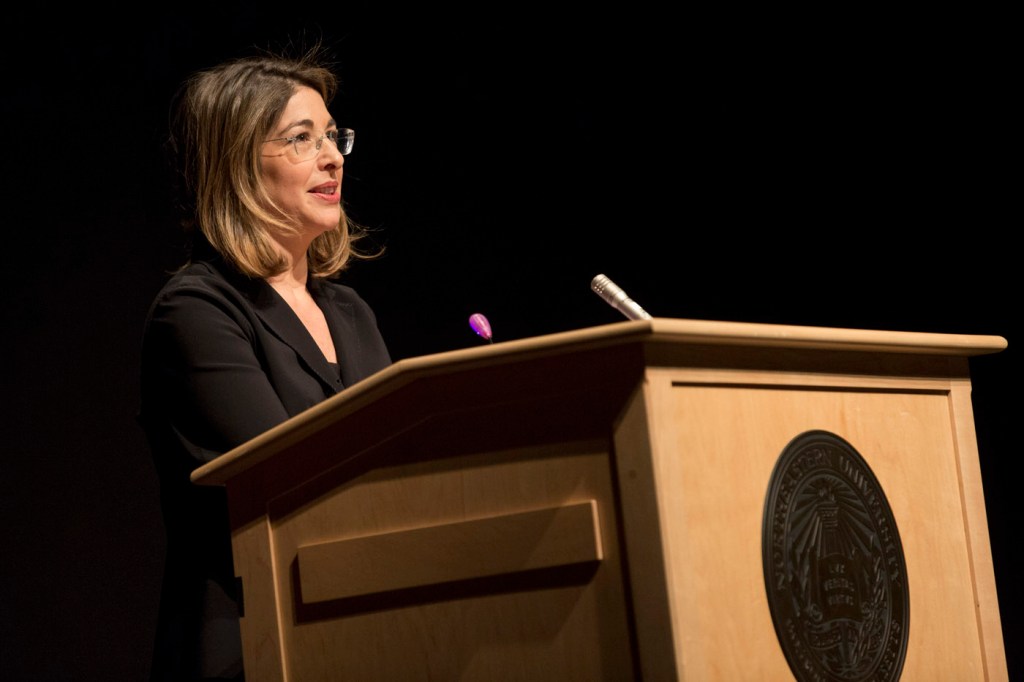Writer, activist Naomi Klein says radical action needed on climate crisis

In her latest book, journalist, author, and social activist Naomi Klein argues that the proper response to the climate crisis is to overhaul global capitalism and the “free-market ideology.” On Thursday night Klein spoke at Northeastern, noting that this will require radical change spurred by a powerful social movement.
“The future is radical,” Klein said. “That’s why I called the book This Changes Everything. When we talk about climate change in 2015, we have to accept the fact that we’ve waited so long, procrastinated so long, we’ve allowed the problem to become so much worse…that we’ve now reached a point when no non-radical options are left on the table.”
Klein’s talk was hosted by the University Scholars Program as part of the Scholars Seminar on Leadership, Research, and Innovation, a semesterlong series featuring thought leaders and change makers. Klein is a contributing editor for Harper’s, a reporter for Rolling Stone, and a regular columnist for The Nation and The Guardian. Her writing has also appeared in other publications such as The New York Times, The Los Angeles Times, The Washington Post, and Newsweek. What’s more, she is a member of the board of directors for 350.org, a global grassroots movement to solve the climate crisis.
Klein said her inspiration for This Changes Everything: Capitalism vs. the Climate stemmed from covering Hurricane Katrina in her previous book in 2007, The Shock Doctrine: The Rise of Disaster Capitalism. “Reporting on that disaster strongly informed my world view,” she said.
To open her address, Klein pointed to the numerous social movements that have sprung up at the local, national, and global levels in recent weeks and months, including #BlackLivesMatter and others movements focused on immigrants’ rights and fossil fuel divestment. She noted that while these are often debated and discussed as separate entities, they are very much interconnected and can be woven into a larger meta-movement toward profound progressive change.
“I believe climate change can be a catalyst for this kind of coalition,” she said. “I don’t think climate change trumps all these other issues—it supercharges them.”

Naomi Klein discussed her latest book, This Changes Everything, at Northeastern last week. Photo by Maria Amasanti, SSH’16/for Northeastern University
In her new book, Klein argues that the climate crisis is in part the result of “a catastrophic case of bad timing,” noting how the public discussions of climate science that began taking shape in 1988 coincided with anti-regulation, privatization, and globalization trends in global business.
But she said on Thursday that she doesn’t want to “get apocalyptic” with her message, adding, “I don’t believe scaring people turns them into activists.” Rather, she noted that there are ample opportunities to take action, pointing several times to Germany, where cities and towns are buying back their energy grids from corporations.
“You can either be overwhelmed or you can be inspired by this,” Klein said of the current state of the climate. “I think precisely because of the urgency of this issue it can form the basis for a truly excited progressive coalition.”
During a Q&A, Klein fielded questions on several topics. One student asked how people can influence policy decisions that lead to meaningful change. In response, Klein compared the strategies to either fight for incremental or radical change. She noted that the best historical example of the radical change needed today was the New Deal, an unprecedented number of government reforms led by President Franklin Delano Roosevelt in response to the Great Depression following the 1929 market crash.
“The argument I’m making,” she said, “is that if we look at periods when this country has changed … they’ve been accompanied by huge social movements working in coalitions with one another, and also in periods when people were willing to debate radical ideas in the public and question capitalism itself.”





